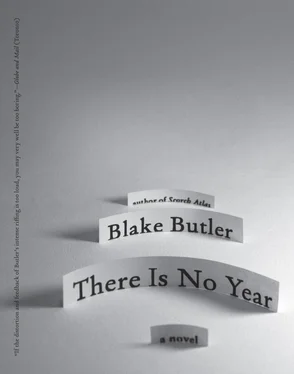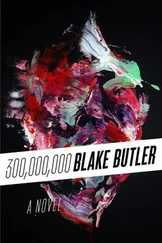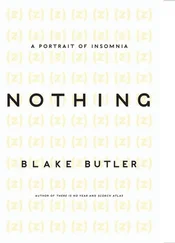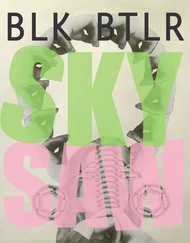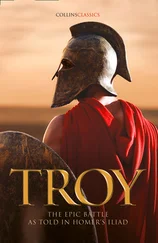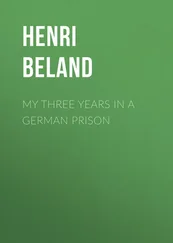As well there were no windows in the walls where to look out onto a light. In locations where in the first house there had been a glass pane, instead the house appeared fully sealed. There were no keyholes in the doors or ways to peep through. No vents or holes beyond the way the father had ripped in. The black clocks all read a certain number. Each black bowl or black glass left out had been turned over upside down, holding its air.
The table in the dining room was shorter, stacked with clean plates, finger bowls. A square black cake — oblong, like an office building. The father touched the icing. Smoke rose in sigh, and stunk. The father tried to wipe the icing off. A tingling. It clung hot to his skin — to his fingers and his shirtsleeve and the tablecloth and air. He rubbed it on the wall there, his fingerprints repeated, smudged.
The father tried to call out into the house around him but his air would not come out — the quick words caught inside him, wobbling. His breath burned in his holes.
In the hall, along the long wall, someone had made a mural of, the father surmised, the sun being crushed into the moon? It was hard to say what was there exactly, but something bright and muddy. Words were written in the pigment’s ridges that the father could not read, or else the words were numbers, small directions. Some seemed to shift when he turned from them. The small door that had before opened into the hair closet was no longer there. The father’s nose began to bleed.
The guest bedroom door was locked. Behind the door, some muted choral moan: low tuba, a beaten box, a gong. Blood from his ears now, too, a little. Throbbing in his eyes.
In the den the books had been turned to face their spines toward the wall. The pressed-together pages packed in grinning, silent with their billion flattened teeth. The father took down a skinny volume, flipped it open, found the pages fudged with see-through gel, lined like a cell inside a hive.
He passed the wall again where the mural had been just before, and in its place a mirror hung. The father was wearing dark pants and a dark shirt, he realized, though he’d come in wearing blue. He had the black cake icing on his face and arms and in his hair and on his teeth. Blood from each hole, a set of greasy spigots, rolling. He was wearing gloves and smoking a cigar. Each inhale, in the mirror, twinned. Each blinking, posed. He was so old.
The hole the father had hacked in through watched him walk back along the carpet to the front room where the front door also had been sealed. No drip of blood or mud or must on any inch of any.
Here the stairwell to the second floor, the father found, went down instead of up.
When the son looked again they were in another room. He’d been laid prostrate on a long deep red sofa with an awning that hid the ceiling from his head. The room held several mirrors. The girl stood behind him, behind the sofa. The girl combed the son’s hair. The hair had so many knots and nits slipped in it. The son felt okay. The combing stunk.
Why weren’t you at school last week? the girl said.
The son felt a spasm in his eye. I was at school, he said. I thought you weren’t.
The girl hummed a little song.
Whenever the girl’s knuckle brushed the son’s scalp, he felt it burn.
What butler? the girl repeated. She laughed out through her nostrils. She tugged hard on the son’s hair. In his cleaned locks, she threaded rings, translucent to the light.
The room they’d come to now was long and thin and had one enormous window, though from where they were sitting the son could not see out. The light changed direction and intensity every several seconds, revealing different parts of the long room. In one section the light revealed a corridor down which the son could hear many other people singing, the same song as the girl. In another section the light revealed a fountain and a man standing at it with his back toward them, completely still.
In completely different light entirely the son saw on the wall behind the girl several long black bags hanging — bags like the one he’d found inside the box. These bags had shapes inside them that stretched their fabric. Some bags were bulgy, flush with weight, while other bags seemed to handle almost nothing. Some of the bags were wet in places. Each one had a tag sewn onto the zipper, filled in another kind of script — names and numbers, illegible descriptions of their contents, where they’d come from, how they’d been. There was at least one bag for every picture the son had seen inside the box, including his — his long black bag hung there on the wall there, open — and many more beyond. Bags and bags unending. It was hard to look at any of them very long. There was no smell inside the room.
The son realized, in the seeing, how he did not actually remember the bag from his own house or the box or his father and mother or his house itself or the house they’d lived in before that one or how he’d come into the house here or how he’d met the girl — these bags had only been in this room here, ever — he wasn’t sure how he knew he realized this. The son’s forehead wormed with flexing meat. He laughed and laughed. He loved the bags. He loved his bag, the skin of its inseam. He loved this house and all the people and the walls that held them in. The son loved the couple who’d come to see and touch the walls inside the other house, their replication, the couple carrying his want . The son loved the slick of sound inside him never ending and loved how he could no longer feel his mouth, his hair pulled down so hard around his skull he needed nothing more than nothing, than the hour of his skin, cells given from the width of many others, in thunder, money, wishing, laughter, need, and mud. He would love this house forever. His house. This girl. He. Hers. Him. The rivers of the air inside his blood in prisms. Evenings.
The son shook his head, looked up by looking down.
His mouth filled up again with nothing — he swallowed hard.
I like to remember things my own way, like anybody, he said, in a second voice, with words that were not words.
The girl laughed louder than the son had. She laughed so hard her eyes shook and she spanked the back of the son’s head and tugged his hair harder than hard and laughed again so loud the air was older and made the son slap her hand with his. She fell back against the wall of bags, disturbing several, the sound of cymbals and of paste . She writhed across the floor. Her body seemed to dance, contorted. Her eyes rolled back in her head. Her neck was bending. Her neck seemed putty. The walls went wrinkled. The son started to stand up. Instead the girl stood up and caught her breath and waved for him to stay. She crossed the room and opened a panel in the ceiling with her long arms— the son had not noticed how long her arms were —and came back out with a can — a fist-sized chrome can with no label but engraved shit the son could not read. She set the can down on a tray. She brought the tray over to the son and stuck a long curled straw through the can top and helped the straw into the son’s mouth. The straw was made of something neither plastic, metal, wood, nor bone. It seemed to fit his teeth.
Drink, the girl said. It is delicious.
The son could not disagree — though the substance was not liquid — nothing there but air at all.
He drank.
the house there all around him, ashing
all through the roof and walls, unwound
in light, his name shaking out its color
shaking out its hours, numbers, nouns
The girl watched the son drink, then took the tray away and went back in place again to comb. She yanked the son’s hair back so hard on his head his scalp strained red, exposed. The son’s scalp had tattoos all through it. The tattoos were of text fine-printed, writ by hand. The hair was held back by a series of small pins that pulled the hair’s roots so tightly they seemed ready to rip out any minute. In the mirror across the room the son could see himself aligned. He could see his room a little, his other room, in that old house. He felt the house inside him, in the mirror, its glass now leaning right against his face. This particular mirror, the son noticed, close up— among the many rooms refracted —this mirror was the same mirror as the one he’d slept with every night. This particular mirror was caving inward there against him, curving, becoming jelly, burble, white. In the mirror now, the son gleamed, of no expression.
Читать дальше
